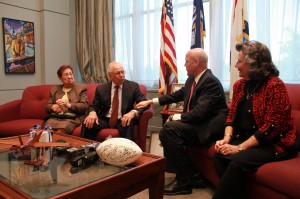New Orleans honors native son who is a Tuskegee Airman
30th January 2012 · 0 Comments
By Travis M. Andrews
The Louisiana Weekly
Sometimes, we can learn from history.
Mayor Mitch Landrieu honored the last surviving New Orleans member of the Tuskegee Airmen, Calvin Moret, in his office on Friday, Jan. 27. Moret took the opportunity to do more than receive the mayor’s gifts and praise, and he turned the spotlight on the crime initiatives in New Orleans by reading a short composition during the ceremony.
Moret is the last surviving New Orleans member of the Tuskegee Airmen, which were a group of African-American pilots who fought in World War II and were the first pilots in the United States military. He trained at the Tuskegee Institute in 1943 to 1944, and was commissioned as a flight officer in Nov. of 1944. In 2007, he received the Congressional Gold Medal.

Calvin Moret, pictured with wife Bernice, is the last surviving New Orleans member of the Tuskegee Airmen. He trained at the Tuskegee Institute in 1943 and 1944, and was commissioned as a flight officer in November 1944
Moret said he’s been receiving more attention recently because of the release of the feature film “Red Tails,” which is an account of the Tuskegee Airmen.
At the ceremony, Mayor Landrieu and New Orleans City Council president Jackie Clarkson presented Moret with a ceramic Zulu coconut, a wooden replica of the planes he flew in World War II, a football signed by the entire New Orleans Saints team and many kind words.
“You have blessed us with your courage and your tenacity,” said Landrieu. “You’ve been an ambassador for the city of New Orleans.”
Clarkson also praised Moret.
“I want to thank you for your dedication to the World War II Museum,” Clarkson said.
The mayor also presented Moret with a key to the city.
“There’s nothing in the vault, but you can try,” joked Landrieu to which Moret replied, “I read the newspapers.”
He took the opportunity to read a short composition on the crime rates in New Orleans.
“Can’t cash this at the bank, but it might be more important,” Moret said of his letter. “Crime reduction will never be fixed by agencies called after the fact.”
Moret criticized the lack of God and morality in public places and said crime will not be reduced by building more jails and adding more people to the police force. Instead, it needs to be stopped before it begins, when young men and women are growing up.
Landrieu thanked him and said, “I think we all have to be called to … making our streets safe.”
After the ceremony, Moret spoke at length about reducing the crime in New Orleans.
“Killing someone is not the way to solve problems,” he said. “[Criminals should ask] ‘What benefit?’ Is the world better off because they killed someone?”
He said the crime needs to be quelled before it begins, not after, and one way to do that is to have more direction in life from a young age.
“If we can decide early in life what we want to do with our lives, we can focus,” he said.
This is one reason he enjoys telling his story and all the attention that Red Tails has brought to him.
“I praise [George Lucas] … for the faith he evidently has that this is a story worth telling,” he said.
And Moret said there is a lot that isn’t in the history books that needs to be told. For example, something as simple as the fact he would have to be able to identify enemy aircraft and allied aircraft within a tenth of a second while in the air, or the fact that “66 Black American pilots died over Europe defending the bombers they were assigned to.”
He said so much isn’t written down that he feels lucky to be able to tell the story, especially since the Tuskegee Airmen cannot pass on their experience in full.
“We can’t [preserve] the Tuskegee Airmen,” he said. “Once we’re gone, we’re gone.”
So he’s taking his responsibility seriously, making appearances across the state and telling stories that go otherwise untold. For example, when he returned from the war in which he would later earn a Congressional Gold Medal, he was not allowed to enroll at Delgado Community College to learn to work at typewriter.
“I wasn’t good enough because my skin was not the right color,” he said.
Regardless, he said he thinks the Tuskegee Airmen were on the forefront of the Civil Rights Movement.
“Not to take away from Martin Luther King or Rosa Parks, but we were opening doors before,” he said.
The ceremony closed with Moret, who sings with a chorus at the World War II museum, singing “Hold Out Your Hand,” the lines of which were fitting for the ceremony.
“You will find many friends all around you if you hold out your hand all the way,” he crooned. “There is hope for tomorrow.”
This article was originally published in the January 30, 2012 print edition of The Louisiana Weekly newspaper
Tags: airmen, civil rights, freedom, George, Lucas, Moret, pilot, red tails, Tuskegee, war, WWII



